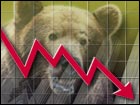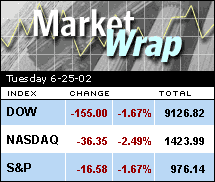
NEW YORK (CNN/Money) -
U.S. stocks fell sharply Tuesday as buyers fled the market, abandoning an early attempt at a rally amid broad tech weakness, sharp declines in blue chips, and overall pessimism about the timeline of a profit recovery.
The Dow Jones industrial average fell 155.00 to 9,126.82. It had been up as much as 130 points earlier in the day. The S&P 500 index fell 16.58 to 976.14.
The Nasdaq composite lost 36.35, falling to 1,423.99; the Nasdaq closed at 1,423.19 on Sept. 21, the end of the first week of trade that followed the markets' closing after the events of Sept. 11.

"There's all this resistance out there right now. The trend is to sell into any rally, so people feel like, 'Why should we buy?,'" Patrick Murphy, managing director at Spear, Leeds & Kellogg Specialists, told CNNfn's Street Sweep. "In terms of what's coming up, we have the Fed meeting tomorrow."
On Wednesday, investors will be focused on the Federal Reserve. The central bank's two-day interest rate-setting meeting is scheduled to conclude by midday, with a decision and comments expected at around 2:15 p.m. Most economists expect the Fed to keep rates steady at 1.75 percent.
Stocks rallied early but couldn't sustain the gains as the day wore on. Traders said the tendency to sell so quickly into rallies reflects a broader lack of faith in any potential stock turnaround, following five weeks of declines for the major indexes.
"The rally this morning couldn't hold up because there's just no conviction," said Tim Heekin, head of stock trading at Thomas Weisel Partners. "There's some selling pressure there, but it's more that buyers have no religion. Tech and telecom are this huge drag on the market. People are buying very defensively in health care, chemicals, consumer products and pharmaceuticals."

Coca-Cola (KO: down $1.50 to $55.45, Research, Estimates) and Procter & Gamble (PG: down $4.40 to $89.00, Research, Estimates) were among the Dow's biggest decliners. Tobacco products maker Philip Morris (MO: down $2.25 to $46.55, Research, Estimates) also traded sharply lower for a second session in a row, along with other tobacco companies, on increased concerns about litigation following a series of multimillion-dollar punitive awards to ailing smokers.
Market breadth was negative. On the New York Stock Exchange, decliners beat advancers by more than 8-to-7 as 1.48 billion shares changed hands. On the Nasdaq, losers beat winners 3-to-2 as 1.85 billion shares traded.
Consumer confidence, housing data offer mixed picture
Investors concerned that the recent pace of the economic recovery may be slowing got a mixed report from Tuesday's news. Consumer confidence and housing sales both declined last month, but not as sharply as economists had expected.
Consumer confidence fell to 106.4 in June from a revised 110.3 the previous month. Economists were expecting a decline to 106. In addition, a real estate group said existing home sales slipped to an annual rate of about 5.75 million units from 5.79 million in April. Economists were expecting a decline to 5.70 million units.
The resilience of the U.S. economy despite wild stock fluctuations has been a source of comfort to investors in recent months, as it has given hope that economic conditions can support an eventual stock turnaround. But recent reports have shown a slowdown in the pace of the recovery, undermining stock investors' hopes.
"We had some decent economic news, but no one believed in the move up. There just isn't a sense that things have turned," said Brian Finnerty, managing director at Melhado Flynn & Associates.
"Traders felt it was just a short-covering rally and it's going to take a lot more than that when we have so far to go," he said, referring to the morning's evaporated gain.
Networking, telecom lower
Meanwhile, weakness in networking and telecom pushed techs lower, with small gains in chip equipment and some software offsetting the losses.
Sun Microsystems (SUNW: down $0.36 to $5.12, Research, Estimates) was one of the Nasdaq's big losers, partly on concerns that federal authorities are investigating allegations that the largest maker of Unix servers favored U.S.-based international workers over American citizens during a recent period of layoffs.
Another big Nasdaq decliner was Cytyc (CYTC: down $4.58 to $6.88, Research, Estimates), a medical diagnostics maker, which fell after the Federal Trade Commission voted Monday to block the company's purchase of rival Digene (DIGE: down $2.90 to $9.79, Research, Estimates), citing antitrust concerns.

Morgan Stanley downgraded the whole wireless infrastructure sector to "cautious," saying the stocks will underperform a predicted 20 percent increase in the Standard & Poor's 500 by the end of 2002. Palm (PALM: down $0.08 to $1.59, Research, Estimates) and Lucent (LU: down $0.31 to $1.97, Research, Estimates) were among the companies included in the downgrade.
Internet stocks were lower on weakness in online retailer Amazon.com (AMZN: down $2.17 to $15.34, Research, Estimates). Shares of the stock fell on concerns about fellow Web retailer Buy.com launching a price war with Amazon, saying it will beat the rival's book prices by 10 percent. The weakness spilled over into Yahoo! (YHOO: down $1.36 to $13.72, Research, Estimates)
On an up note, chipmaker On Semiconductor (ONNN: up $0.47 to $2.07, Research, Estimates) raised its quarterly forecast, saying it sees a pickup in demand for its services.
Shares of freight delivery company FedEx (FDX: down $8.02 to $48.00, Research, Estimates) fell after the company said that current quarter results will be lower than analysts expected.
Treasurys rose, pushing the 10-year note yield down to 4.81 percent.
European markets rose, while Asian markets closed mostly lower. The dollar was weaker against the euro and a little higher against the yen. Light crude oil prices fell 19 cents to $26.32 a barrel.

|

